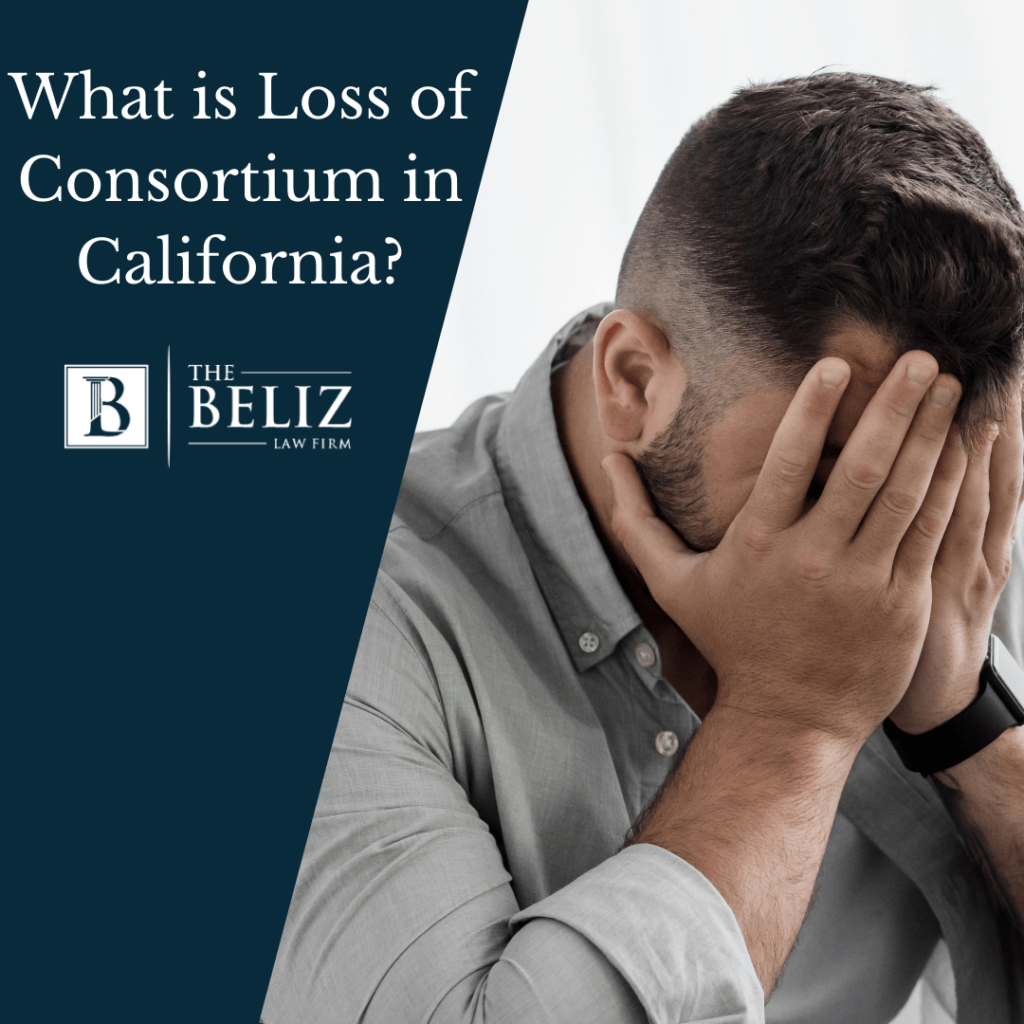A loss of consortium claim in California compensates a spouse for the loss of love, companionship, intimacy, and emotional support due to their partner’s injury caused by negligence. To file, the uninjured spouse must prove a valid marriage, the injury’s significant impact on the relationship, and clear evidence of the resulting emotional and relational harm.
When a loved one suffers a severe injury, the emotional and practical repercussions extend far beyond the immediate physical effects. In California, if your spouse or registered domestic partner has sustained injuries due to someone else’s negligence, you may have the right to seek compensation not just for the medical bills and lost wages but also for the loss of companionship, affection, and support.
Loss of consortium in California recognizes an injury’s profound impact on a marriage’s intimate, personal aspects.

In this post, we’ll explore what you need to know about pursuing a loss of consortium claim—from understanding the legal definitions and eligibility requirements to proving your claim and calculating potential damages.
Whether you are newly navigating these waters or seeking further clarification, our guide aims to provide clear and empathetic insights into how you can seek justice for the emotional and support-related losses you have endured.
What Is a Loss of Consortium Claim?
Loss of consortium as defined in California’s Civil Jury Instructions 3920 references the deprivation of the benefits of a specific type of familial relationship due to injuries caused by another party. This loss includes the loss of love, comfort, companionship, affection, solace, moral support, and, in some cases, the loss of the ability to have children or the sexual relationship between spouses.
In California, the law recognizes these aspects. Although intangible and non-economic, they are invaluable to the quality of life and, thus, are compensable.
The emotional toll on a spouse who must now cope with both the immediate and long-term implications of their partner’s injury cannot be understated. Loss of consortium goes beyond financial hardship; it encompasses the profound emotional and psychological distress experienced when the dynamic of a marital relationship is fundamentally altered.
Who Can Bring a Loss of Consortium Claim in California?
Only some people can legally file a loss of consortium claim in California. The right is reserved primarily for the uninjured spouse of someone directly harmed by another’s negligence or wrongful act. There must be a legally recognized marriage or, in some cases, a registered domestic partnership where the partners live together.
It is crucial that the marriage or partnership existed legally at the time of the injury. Merely dating or being related in a way that is not marital would not qualify.
Further, the spouse’s injury must be serious and significantly impact the couple’s relationship. Minor injuries with little to no long-lasting effects on the marital relationship typically do not qualify for loss of consortium damages.
Proving Loss of Consortium
Proving a loss of consortium claim in California requires clear and compelling evidence demonstrating the negative impact on the marital relationship.
Key elements include proving the:
- Validity of the marriage at the time of injury,
- Severity and impact of the injury on the injured spouse, and
- Consequent negative effect on the marital relationship.
- Medical records,
- Testimonies from family and friends about the relationship before and after the injury, and
- Expert testimony regarding the psychological and emotional impacts.
Photographs, videos, and personal diaries can also be instrumental in showing the quality of life and the couple’s interaction before the accident. The uninjured spouse may need to discuss intimate details of their marital life to convey the depth of their loss, which can include changes in affection, support, companionship, and even day-to-day interaction. This evidence helps paint a vivid picture of the loss and its profound effects on the uninjured spouse.
Calculating Loss of Consortium Damages
Determining the amount of compensation for loss of consortium damages can be complex due to the subjective nature of the losses involved.
In California, juries and judges consider several factors when assessing these damages at trial, including the stability and closeness of the marriage, the living arrangements before and after the injury, and the life expectancy of both spouses. These factors help to measure the extent of loss and translate it into a monetary value.
Economic experts may be employed to provide testimony on the loss’s impact on the spouse’s quality of life and future projections of this loss. While there is no fixed formula, the compensation typically reflects the severity of the injury and its long-term effects on the marital relationship.
Have a Loss of Consortium Claim in California? Contact The Beliz Law Firm
Understanding the intricacies of loss of consortium in California is crucial in advocating for the compensation you rightfully deserve. If you are grappling with the effects of an injury that has disrupted your relationship with your spouse, it’s important to seek legal advice.
At The Beliz Law Firm, we’re dedicated to helping you through these challenging times with empathy. Our team has years of experience with loss of consortium claims and is well-equipped to guide you every step of the way. Don’t try to pursue a loss of consortium claim alone.
Contact The Beliz Law Firm today for a consultation, and let us help you secure the compensation you need to begin the process of emotional and financial recovery.
